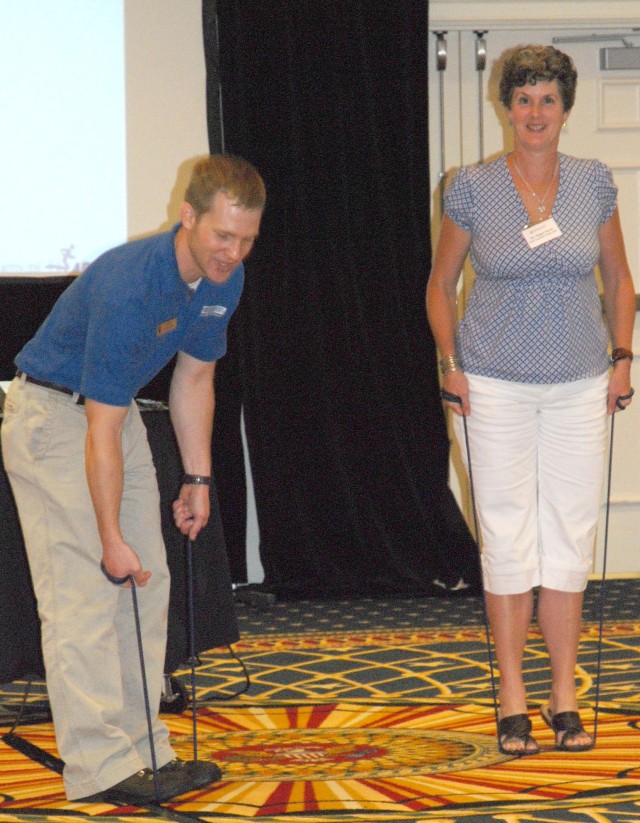
GETTYSBURG, Pa. (August 19, 2009)-Col. (Dr.) Thomas J. Williams and Christopher Kusmiesz from the Army Physical Fitness Research Institute delivered a presentation to TRADOC spouses emphasizing health concerns and how to make healthy decisions everyday during the TRADOC Senior Leaders Conference here on Wednesday.
Williams, the director of APFRI, provided health statistics from Command and General Staff College, the U.S. Army War College and the U.S. Army Sergeants Major Academy as well as disease and lifestyle statistics that pertain to women.
"50% of our majors at CGSC have diastolic prehypertension; that means that they have to make serious life decisions about their health," he said to the 42 wives. Diastolic prehypertension is a precursor to hypertension, also known as high blood pressure.
On the senior enlisted side, Williams noted that 34% of sergeants major at USASMA have low HDL, or good cholesterol levels.
Some of the health issues facing women include heart disease and lung and breast cancer.
"More women die of lung cancer than breast cancer and the rates have been rising since 1930," he said.
While contributing factors to health problems in women include poor diet, lack of exercise, poor sleeping habits and even genetics, Williams put a particular emphasis on the physiological effects of stress.
"Points of stress can be deployment, family separation, aging, caring for parents and kids-taking care of your own family is stressful," said Williams.
While all Americans should be aware of the health concerns such as cancer, obesity, and heart disease, many of these concerns can be combated through preventative measures. Williams provided tips to improve the quality of life and integrate healthy habits throughout the day. He targeted diet and exercise, among others as some of the variables that spouses can control.
While most spouses grew up hearing that 'breakfast was the most important meal of the day', Williams provided medical proof of breakfast's value.
"Eat within 1.5 hours of waking up. If you don't, then you start to lose lean muscle," he said.
Meals rich in nutrients can not only lead to a healthy heart, but protect the body from other illnesses.
"Pomegranate potently and reproducibly kills prostate and breast cancer cells in culture, so when you're looking for that morning fruit, then you should reach for that pomegranate," he said.
Similarly, garlic and ginger help women fight breast cancer, reduce blood pressure and lower LDL cholesterol levels. Antioxidants such as lycopene found in tomatoes and anthocyanins found in blueberries are revealed to help the body fend off cancer, diabetes and neurological disease. Glucosinates in dark greens prevent certain tumors from forming.
Regular exercise was emphasized and even practiced during the presentation.
"For men, having a waist size of 40 inches and 35 inches for women greatly increases the risk of heart disease," said Williams. "70% of what we attribute to aging is from lack of exercise. Even a little regular activity will reduce your risk of heart disease by 30 or 40%. Think of exercise as medicine. It's your way of medicating yourself against heart disease and breast cancer."
Williams provided a scenario where a senior Soldier will return from deployment and try to get back into a regular exercise routine and recommends that anyone returning to exercise after a long hiatus to be cautious.
"If you haven't been active in two to eight months, then you should probably get medically cleared before you start anything," he said.
The effects of exercise can be seen in mental health because it keeps the brain engaged. Williams said that one area women tend to ignore in exercise is strength training. Strength training conditions bones to absorb more nutrients, which is particularly important because women begin to lose bone density as early as in their 30s.
The spouses were then led into a series of strength training exercises by Chris Kusmiesz, exercise physiologist with APFRI. Spouses were provided with portable elastic bands and learned different exercises that engage all of their muscle groups.
Williams closed by encouraging spouses to listen to their bodies and to promote healthy habits with their husbands and families.
"At the War College, we've had two colonels self-diagnose their own prostate cancer. One had a PSA level of 1.1 and not long after, he had a level of 2.1. And most physicians won't pay attention unless it's under 4.5," he said. "I'm confident that this would have gone undetected had they not paid attention to their health."

Social Sharing